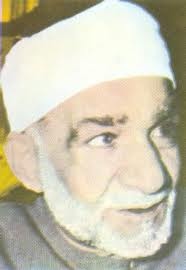Sheik Mahmood Shaltut (1893-1963) was an outstanding Muslim scholar from Egypt. He is most famous for having served as the Grand Mufti of the prestigious Al-Azhar University (الإمام الأكبر or شيخ الأزهر الشريف) in Cairo during the key years of 1958-1963. (Zebiri, 210). As one author describes his life, “Shaltut himself had been one of a small group of reform-minded ‘ulama’ who were expelled from the Azhar for their campaigning activities as early as 1931.” (Zebiri, 210). He managed to catapult to the top of the religious hierarchy after being castigated for many years in Egypt. His open-mindness is often said to have been reflected in the style of his legal opinions (fatwas), where he attempted to confront some of the particular problems faced by Muslims in the modern age. Heavily influenced by the early Egyptian Islamic modernist Muhammad Abduh ( محمد عبده, 1949-1905), Shaltut initiated important reforms in the manner in which the ulama of the Al-Azhar communicated with the ordinary believer. His writings are described as combining “straightforward non-technical language with homiletic eloquence.” (Zebiri, 213). This style was a function of reforming what he thought as an outdated system of writing where scholars would often write in an often impenetrably difficult line of reasoning to arrive at conclusions that were obscure and confusing to the laymen.
But perhaps Shaltut’s greatest endeavor during his short reign at the helm of Al-Azhar was his attempt to address the sectarianism in Islam. He consistently demonstrated a desire for Muslim unity. For example, Shaltut was closely involved in the establishment of Jama’at al-Taqrib bayna al-Madhahib (Institute for Promoting Proximity between the Schools of Islam), an organization established by a group of eminent Sunni and Shi’i scholars with the professed aim of bringing Sunnis and Shi’is closer together and eliminating the sectarian spirit raging (and, unfortunately, still raging today). This was created in a similar spirit like that of the Egyptian Center for Rapprochement of Islamic Sects, Dar al-Taqrib bayna al-Madhahib al-Islamiyya (1948-1980),which was founded by Iranians but participated in by Muslims from across the Islamic world, with the goal of abandoning both the “medieval” tradition of Shi’i-Sunni polemics and the “modern” call of Arab and Iranian secularism.
In 1958, first year as the head of Al-Azhar, Shaltut issued an extremely controversial legal injunction that recognized the Shi’i-Jaa’fari madhab (school of thought) as a legitimate form of worship in Islam, and there is ultimately no theological difference between a Shi’i and Sunni before God’s eyes. This fatwa was issued with the extensive hard work of the late and Great Sheik Muhammad Jawad Chirri (1905-1994). Sheik Chirri was born in Lebanon on October 1, 1905. Chirri had migrated from Najaf, Iraq after completion of his studies to Detroit, Michigan in 1948 at the invitation of a small Muslim community being developed there. About ten years later, Sheik Chirri traveled met with President Gamal Abdel-Nasser of Egypt, attempting to solicit from his financial assistance to build an Islamic Center in Detroit. After obtaining Nasser’s pledge for help, Sheik Chirri met with Sheikh Mahmood Shaltut. In the context of civility and humility, both spiritual leaders arrived at a conclusion that the Shi-ite Jaafari and Sunnite Schools were equal. Sheik Shaltut also played a pivotal role in introducing into the Al-Azhar curriculum the study of Ja’afari Shi’ jurisprudence. This spirit of unity is evident in some of his monumental work on Islamic Law, in which he would refer and cite to Shi’i authorities, including contemporary heavyweights at that time from Najaf. (Zebiri, 214).
Shaltut also was not afraid to challenge established dogma, and he actively sought to expand the narrow scope of religious belief that often sowed the conditions for the accusations of kufr (takfir) to be made lightly against other Muslims. Once, Shaltut declared, based on a close reading of the Qu’ranic text and commentaries, that it was not an article of faith to believe that the Prophet Jesus, son of Mary, was physically raised up to be with God in heaven, where he now lives, a storm of controversy was unleashed in the halls of Al-Azhar and around the Muslim world. (Zebiri, 214). Shaltut also strongly opposed the near-crazy obsession certain scholars and students in Islamic seminaries often had with the extreme details of Islamic jurisprudence, chastising the seeming neglect of the underlying spirit of the law. Although he was averse at issuing fatwas, in one of his most controversial opinion, Sheik Shaltut believed “that the pleasure which man feels listening to music can only be an innocent one, as it is part of human nature to be attracted to that which is aesthetically pleasing; therefore, music cannot be intrinsically haram (impermissible). This is a notable conclusion, and still a minority position in the Islamic community. Holding such a view today (remember, Shaltut was writing over a half-century ago) would surely generate controversy and disdain. This is unfortunate. (Zebiri, 214). A general theme of Shaltut’s fiqh was his desire to minimize the hardship on the ordinary believer, consistently trying to privilege the divine principle of yusr (ease, or lack of hardship) to arrive at highly contentious opinions, detailed in the article attached.
Bibliography
KATE ZEBIRI, Shaykh Mahmod Shaltot: Between Tradition and Modernity, Journal of Islamic Studies (2) (1991) pp. 210-224 (University of London).
Bentley Historical Library, University of Michigan Entry on Sheik Chirri, available at: http://bentley.umich.edu/general/findingaids/chirrim.pdf
Re-Reading Iranian Shi’ism: International and Transnational Connections and Influence, available at: http://iranianstudies.com/node/200








Trackbacks/Pingbacks
[…] Sheik Mahmood Shaltut (الشيخ محمود شلتوت) (irshadonline.org) […]